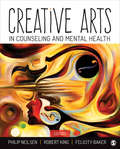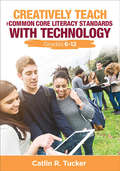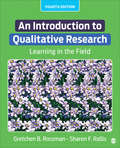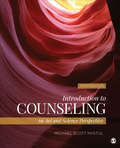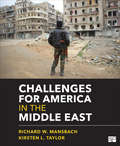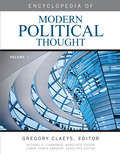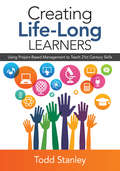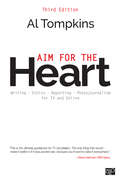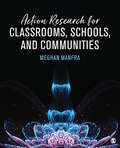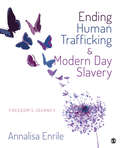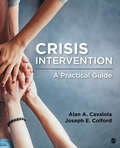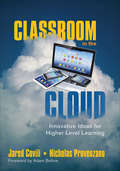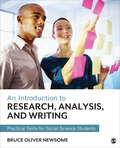- Table View
- List View
Creative Arts in Counseling and Mental Health
by Felicity Baker Philip Neilsen Robert KingDrawing on new paradigms and evidence-based discoveries in neuroscience, narrative psychology, and creativity theory, this text explores the beneficial role of expressive arts within a recovery perspective. A framework of practice principles for the visual arts, creative writing, music, drama, dance, and digital storytelling is addressed across a number of settings and populations, providing readers with an accessible overview of techniques taught in counseling programs in the U.S. and abroad.
Correctional Theory: Context and Consequences
by Francis T. Cullen Cheryl Lero Jonson"The text is an incredible composite of the literature that has shaped correctional practice. The authors have a great capacity for making research interesting and accessible. Cullen and Jonson have accomplished their goal of motivating readers to become sophisticated consumers of correctional knowledge." —Betsy Matthews, Eastern Kentucky University The Second Edition of Correctional Theory: Context and Consequences continues to identify and evaluate the major competing theories used to guide the goals, policies, and practices of the correctional system. Authors Francis T. Cullen and Cheryl Lero Jonson demonstrate that changes in theories can legitimize new ways of treating and punishing offenders, and they help readers understand how transformations in the social and political context of U.S. society impact correctional theory and policy. Designed to motivate readers to become sophisticated consumers of correctional information, the book emphasizes the importance of using evidence-based information to guide decisions, rather than relying on nonscientific commonsense or ideology-based beliefs.
Correctional Theory: Context and Consequences
by Francis T. Cullen Cheryl Lero Jonson"The text is an incredible composite of the literature that has shaped correctional practice. The authors have a great capacity for making research interesting and accessible. Cullen and Jonson have accomplished their goal of motivating readers to become sophisticated consumers of correctional knowledge." —Betsy Matthews, Eastern Kentucky University The Second Edition of Correctional Theory: Context and Consequences continues to identify and evaluate the major competing theories used to guide the goals, policies, and practices of the correctional system. Authors Francis T. Cullen and Cheryl Lero Jonson demonstrate that changes in theories can legitimize new ways of treating and punishing offenders, and they help readers understand how transformations in the social and political context of U.S. society impact correctional theory and policy. Designed to motivate readers to become sophisticated consumers of correctional information, the book emphasizes the importance of using evidence-based information to guide decisions, rather than relying on nonscientific commonsense or ideology-based beliefs.
Creatively Teach the Common Core Literacy Standards With Technology: Grades 6-12 (Corwin Teaching Essentials)
by Catlin R. TuckerLet technology pave the way to Common Core success. Your transition to the Common Core just got easier! When you start getting creative with technology, you’ll turn your classroom into a student-centered learning environment that fosters collaboration, individualizes instruction, and cultivates essential technological literacy. This book is your road map to student success—while meeting the Common Core ELA and literacy standards. Features include: Specific recommendations for free apps and tech tools that support the Common Core Step-by-step guidelines to breaking down a Common Core standard for your grade and subject Teacher-tested, lesson ideas and teaching strategies Replicable resources, including prewriting activities and writing templates Real-life examples You don’t need to be in a 1:1 school to do amazing things with technology. With just a few devices, you can engage a whole class! Delve into the Common Core ELA standards by having students experiment creatively with the tech tools at hand for a more meaningful and resonant learning experience. "The book contains a tremendous collection of actionable ideas that can be seamlessly implemented to make a difference in all aspects of the classroom. A must-own guide that will surely be a teacher′s go-to resource to help bring the standards to life." Adam Bellow, Founder of eduTecher / eduClipper Plainview, New York "Catlin Tucker provides great ideas for student use of technology tools that cross the curriculum areas and allow the students to showcase their mastery of content. Students will love how the traditional classroom assessments are transformed!" Kathy Schrock, Educational Technologist, Adjunct Instructor Wilkes University, PA
An Introduction to Qualitative Research: Learning in the Field
by Sharon F Rallis Gretchen B RossmanThe updated Fourth Edition of Rossman and Rallis’s popular introductory text leads the new researcher into the field by explaining the core concepts through theory, research, and applied examples. Woven into the chapters are three themes that are the heart of the book: first, research is about learning; second, research can and should be useful; and finally, a researcher should practice the highest ethical standards to ensure that a study is trustworthy. The Fourth Edition includes an elaborate discussion of systematic inquiry as well as a nuanced discussion of developing a conceptual framework.
An Introduction to Qualitative Research: Learning in the Field
by Sharon F Rallis Gretchen B RossmanThe updated Fourth Edition of Rossman and Rallis’s popular introductory text leads the new researcher into the field by explaining the core concepts through theory, research, and applied examples. Woven into the chapters are three themes that are the heart of the book: first, research is about learning; second, research can and should be useful; and finally, a researcher should practice the highest ethical standards to ensure that a study is trustworthy. The Fourth Edition includes an elaborate discussion of systematic inquiry as well as a nuanced discussion of developing a conceptual framework.
Introduction to Counseling: An Art and Science Perspective
by Michael S. NystulIntroduction to Counseling provides an overview of counseling and the helping professions from the perspective of art and science—the science of counseling that generates a knowledge base proven to promote competency and efficacy in the practitioner, and the art of using this knowledge base to build skills that can be applied sensitively to clients in a multicultural society. The Fifth Edition has been organized into three sections: (1) an overview of counseling and the counseling process, (2) multicultural counseling and counseling theories, and (3) special approaches and settings. It continues to address key topics and issues, including gender, culture, and sexual orientation, and offers ways to integrate multiculturalism into all aspects of counseling, rather than view it as a separate entity. Highlighting emerging trends and changes in ethical codes, as well as reflecting the latest updates to the Diagnostic Statistical Manual (DSM-5), the book successfully illustrates the importance of art and science to modern-day counseling.
Challenges for America in the Middle East
by Richard W. Mansbach Kirsten L. TaylorChallenges for America in the Middle East offers a comprehensive and contemporary analysis of the foreign policy challenges the United States faces in the Middle East. It takes a close look at the critical policy dilemmas posed by radical Islam, the Arab Spring, the Shia Crescent, and Israel–Palestine relations. Authors Richard W. Mansbach and Kirsten L. Taylor examine the issues from a historical perspective and in the context of the current state of affairs, and analyze options for future action. Throughout the text, they emphasize the interplay of foreign and domestic issues in the United States and overseas, and show how that interplay shapes American policy towards the region.
Challenges for America in the Middle East
by Richard W. Mansbach Kirsten L. TaylorChallenges for America in the Middle East offers a comprehensive and contemporary analysis of the foreign policy challenges the United States faces in the Middle East. It takes a close look at the critical policy dilemmas posed by radical Islam, the Arab Spring, the Shia Crescent, and Israel–Palestine relations. Authors Richard W. Mansbach and Kirsten L. Taylor examine the issues from a historical perspective and in the context of the current state of affairs, and analyze options for future action. Throughout the text, they emphasize the interplay of foreign and domestic issues in the United States and overseas, and show how that interplay shapes American policy towards the region.
Encyclopedia of Modern Political Thought (set)
by Gregory ClaeysThis groundbreaking new work explores modern and contemporary political thought since 1750, looking at the thinkers, concepts, debates, issues, and national traditions that have shaped political thought from the Enlightenment to post-modernism and post-structuralism. Encyclopedia of Modern Political Thought is two-volume A to Z reference that provides historical context to the philosophical issues and debates that have shaped attitudes toward democracy, citizenship, rights, property, duties, justice, equality, community, law, power, gender, race, and legitimacy over the last three centuries. It profiles major and minor political thinkers, and the national traditions, both Western and non-Western, which continue to shape and divide political thought. More than 200 scholars from leading international research institutions and organizations have provided signed entries that offer comprehensive coverage of: Thought of regions and countries, including African political thought, American political thought , Australasian political thought (Australian and New Zealand), Chinese political thought, Indian political thought, Islamic political Thought, Japanese political thought, and more Thought regarding contemporary issues such as abortion, affirmative action, animal rights, European integration, feminism, humanitarian intervention, international law, race and racism, and more The ideological spectrum from Marxism to neoconservatism, including anarchism, conservatism, Darwinism and Social Darwinism, Engels, fascism, the Frankfurt School, Lenin and Leninism, socialism, and more Connections of political thought to key areas of politics and other disciplines such as economics, psychology, law, and religion Notable time periods of political thought since 1750 Concepts including class, democratic theory, liberalism, nationalism, natural and human rights, and theories of the state Theorists and political intellectuals, both Western and non-Western including John Adams, Edmund Burke, Mohandas Gandhi, Immanuel Kant, Ayatollah Khomeini, Ernst Friedrich Schumacher, George Washington, and Mary Wollstonecraft
Creating Life-Long Learners: Using Project-Based Management to Teach 21st Century Skills
by Todd M. StanleyWanted for the global workforce: thinkers (and those who can teach them) Where K-12 instruction once centered on content and memorization, today’s educators want, most of all, to teach their students to think critically and perceptively. What better way than with project-based learning (PBL)? Author Todd Stanley provides a teacher-friendly, step-by-step approach to implementing PBL, focusing on the 21st century "three R’s": readiness, responsibility, and relevance. Educators will be prepared to put this practical methodology to work right away, as they learn how to Use project and classroom management skills to create a positive, productive learning environment Develop curriculum around ten different project types Link projects with today’s standards Teach students how to effectively collaborate and bring out the best in each other Readers will find an abundance of ideas and clear guidance, along with new strategies for instilling the skills students need for tomorrow’s workforce. "If you are looking for a way to produce higher level thinkers, you really need to read this book. It is a recipe for successful life long learners." Tamara Daugherty, Teacher Lakeville Elementary School "Student lead project based learning fuses today’s classroom with the demands of the fast paced future. Students need to be able to interact and problem solve not just with each other, but also within the community and with technology. This book is a guide for helping educators make that jump with their instruction." Debra K. Las, Teacher Rochest Public Schools
Creating Life-Long Learners: Using Project-Based Management to Teach 21st Century Skills
by Todd M. StanleyWanted for the global workforce: thinkers (and those who can teach them) Where K-12 instruction once centered on content and memorization, today’s educators want, most of all, to teach their students to think critically and perceptively. What better way than with project-based learning (PBL)? Author Todd Stanley provides a teacher-friendly, step-by-step approach to implementing PBL, focusing on the 21st century "three R’s": readiness, responsibility, and relevance. Educators will be prepared to put this practical methodology to work right away, as they learn how to Use project and classroom management skills to create a positive, productive learning environment Develop curriculum around ten different project types Link projects with today’s standards Teach students how to effectively collaborate and bring out the best in each other Readers will find an abundance of ideas and clear guidance, along with new strategies for instilling the skills students need for tomorrow’s workforce. "If you are looking for a way to produce higher level thinkers, you really need to read this book. It is a recipe for successful life long learners." Tamara Daugherty, Teacher Lakeville Elementary School "Student lead project based learning fuses today’s classroom with the demands of the fast paced future. Students need to be able to interact and problem solve not just with each other, but also within the community and with technology. This book is a guide for helping educators make that jump with their instruction." Debra K. Las, Teacher Rochest Public Schools
Aim for the Heart: Write, Shoot, Report and Produce for TV and Multimedia
by Al TompkinsAl Tompkins teaches students about broadcast journalism using a disarmingly simple truth—if you aim for the heart with the copy you write and the sound and video you capture, you will compel your viewers to keep watching. With humor, honesty, and directness, award-winning journalist and author Al Tompkins bottles his years of experience and insight in a new Third Edition that offers students the fundamentals they need to master journalism in today’s constantly evolving media environment, with practical know-how they can immediately put to use in their careers. Aim for the Heart is as close as you can get to spending a week in one of Tompkins’s training sessions that he has delivered in newsrooms around the world, from which students: • Learn how to build compelling characters who connect with the audience • Write inviting leads • Get memorable soundbites • See how to light, crop, frame, and edit compelling videos • Learn how to leverage social media to engage audiences • Gain critical thinking skills that move your story from telling the "what" to telling the "why"
Aim for the Heart: Write, Shoot, Report and Produce for TV and Multimedia
by Al TompkinsAl Tompkins teaches students about broadcast journalism using a disarmingly simple truth—if you aim for the heart with the copy you write and the sound and video you capture, you will compel your viewers to keep watching. With humor, honesty, and directness, award-winning journalist and author Al Tompkins bottles his years of experience and insight in a new Third Edition that offers students the fundamentals they need to master journalism in today’s constantly evolving media environment, with practical know-how they can immediately put to use in their careers. Aim for the Heart is as close as you can get to spending a week in one of Tompkins’s training sessions that he has delivered in newsrooms around the world, from which students: • Learn how to build compelling characters who connect with the audience • Write inviting leads • Get memorable soundbites • See how to light, crop, frame, and edit compelling videos • Learn how to leverage social media to engage audiences • Gain critical thinking skills that move your story from telling the "what" to telling the "why"
Action Research for Classrooms, Schools, and Communities
by Meghan M. ManfraAction Research for Classrooms, Schools, and Communities is a core textbook for the action research course. This book addresses the trend toward high-stakes testing and teacher accountability by focusing on understanding student outcomes. With edTPA rapidly becoming part of the requirements for teacher certification, teacher preparation programs will increasingly be looking to measure the impact of the teacher candidate on student learning. The book focuses on the potential for action research to lead to greater understanding about student outcomes from the perspective of teachers, school leaders, and community members. There is a special emphasis on helping pre-service and experienced teachers use action research to understand their impact on student learning. There is an emphasis on using action research to understand community impacts on schools; unlike other books, this text acknowledges the complex ecology linking classrooms, schools, and the community, especially regarding issues fundamental to school reform.
Action Research for Classrooms, Schools, and Communities
by Meghan M. ManfraAction Research for Classrooms, Schools, and Communities is a core textbook for the action research course. This book addresses the trend toward high-stakes testing and teacher accountability by focusing on understanding student outcomes. With edTPA rapidly becoming part of the requirements for teacher certification, teacher preparation programs will increasingly be looking to measure the impact of the teacher candidate on student learning. The book focuses on the potential for action research to lead to greater understanding about student outcomes from the perspective of teachers, school leaders, and community members. There is a special emphasis on helping pre-service and experienced teachers use action research to understand their impact on student learning. There is an emphasis on using action research to understand community impacts on schools; unlike other books, this text acknowledges the complex ecology linking classrooms, schools, and the community, especially regarding issues fundamental to school reform.
Ending Human Trafficking and Modern-Day Slavery: Freedom′s Journey
by Annalisa EnrileBringing together conceptual, practice, and advocacy knowledge, Ending Human Trafficking and Modern-Day Slavery: Freedom′s Journey explores the complexities of human trafficking and modern-day slavery through a global perspective. This comprehensive, multidisciplinary text includes a discussion of the root causes and structural issues that continue to plague society, as well as real-life case studies and vignettes, the words of human trafficking survivors, and insights from first responders and anti-trafficking advocates. Each chapter includes a "call to action" to inspire readers to implement a range of strategies designed to disrupt, eradicate, or mitigate human trafficking and modern-day slavery.
Ending Human Trafficking and Modern-Day Slavery: Freedom′s Journey
by Annalisa EnrileBringing together conceptual, practice, and advocacy knowledge, Ending Human Trafficking and Modern-Day Slavery: Freedom′s Journey explores the complexities of human trafficking and modern-day slavery through a global perspective. This comprehensive, multidisciplinary text includes a discussion of the root causes and structural issues that continue to plague society, as well as real-life case studies and vignettes, the words of human trafficking survivors, and insights from first responders and anti-trafficking advocates. Each chapter includes a "call to action" to inspire readers to implement a range of strategies designed to disrupt, eradicate, or mitigate human trafficking and modern-day slavery.
Encyclopedia of Modern Political Thought (set)
by Gregory ClaeysThis groundbreaking new work explores modern and contemporary political thought since 1750, looking at the thinkers, concepts, debates, issues, and national traditions that have shaped political thought from the Enlightenment to post-modernism and post-structuralism. Encyclopedia of Modern Political Thought is two-volume A to Z reference that provides historical context to the philosophical issues and debates that have shaped attitudes toward democracy, citizenship, rights, property, duties, justice, equality, community, law, power, gender, race, and legitimacy over the last three centuries. It profiles major and minor political thinkers, and the national traditions, both Western and non-Western, which continue to shape and divide political thought. More than 200 scholars from leading international research institutions and organizations have provided signed entries that offer comprehensive coverage of: Thought of regions and countries, including African political thought, American political thought , Australasian political thought (Australian and New Zealand), Chinese political thought, Indian political thought, Islamic political Thought, Japanese political thought, and more Thought regarding contemporary issues such as abortion, affirmative action, animal rights, European integration, feminism, humanitarian intervention, international law, race and racism, and more The ideological spectrum from Marxism to neoconservatism, including anarchism, conservatism, Darwinism and Social Darwinism, Engels, fascism, the Frankfurt School, Lenin and Leninism, socialism, and more Connections of political thought to key areas of politics and other disciplines such as economics, psychology, law, and religion Notable time periods of political thought since 1750 Concepts including class, democratic theory, liberalism, nationalism, natural and human rights, and theories of the state Theorists and political intellectuals, both Western and non-Western including John Adams, Edmund Burke, Mohandas Gandhi, Immanuel Kant, Ayatollah Khomeini, Ernst Friedrich Schumacher, George Washington, and Mary Wollstonecraft
Evaluating Professional Development
by Thomas R. GuskeyHow do we determine the effects and effectiveness of activities designed to enhance the professional knowledge and skills of educators so that they might improve the learning of students? Thomas R. Guskey explores the processes and procedures involved in evaluating professional development, from the very simple to the very complex, at five increasing levels of sophistication: Participants′ reactions to professional development How much participants learn Evaluating organizational support and change How participants use their new knowledge and skills Improvement in student learning . . . complete with sample evaluation forms, checklists, and helpful hints and tips.
Coherence: The Right Drivers in Action for Schools, Districts, and Systems
by Michael Fullan Joanne QuinnComplex times call for clear solutions—If initiative overload and fragmentation are keeping your best plans from becoming reality, it’s time to start leading differently. The key to bringing about the kind of successful and sustainable change you need is the Coherence Framework, a dynamic, customizable road map made up of four essential components: Focused direction to build collective purpose Cultivating collaborative cultures while clarifying individual and team roles Deepening learning to accelerate improvement and foster innovation Securing accountability from the inside out Coherence provides the insights and tools to drive effective leadership. Now you can gain a deeper understanding of Coherence with The Taking Action Guide to Building Coherence in Schools, Districts, and Systems. Coherence is a book that demands action – it moves from the narrative of fixing one teacher at a time, to asking about the coherence of the system (be it school, national, or world issues). Fullan and Quinn create an important narrative about direction, working together, deepening learning, and securing accountability. The book sparkles with examples of coherence in action, it makes no excuses for employing the wrong levers of change. This is the blueprint for a new vocabulary of education action; it shows where we need to go next, and is another example of Fullan at the top of his game. John Hattie Director, Melbourne Education Research Institute and Author of Visible Learning "School systems that struggle are riddled with incoherence—mismatched strategies, competing cultures, and illogical initiatives. Fullan and Quinn explain clearly how coherence can solve the problem. Based on solid research and lessons drawn from effective practice, Coherence provides a comprehensive model to guide educators as they learn and lead their way to better schools." Susan Moore Johnson Jerome T. Murphy Research Professor Harvard Graduate School of Education
Crisis Intervention: A Practical Guide (Crisis Intervention Ser.)
by Joseph E. Colford Alan A. CavaiolaCrisis Intervention takes into account various environments and populations across the lifespan to provide students with practical guidelines for managing crises. Drawing on over 25 years of relevant experience, authors Alan A. Cavaiola and Joseph E. Colford cover several different types of crises frequently encountered by professionals in medical, school, work, and community settings. Models for effectively managing these crises are presented along with the authors’ own step-by-step approach, the Listen–Assess–Plan–Commit (LAPC) model, giving students the freedom to select a model that best fits their personal style or a given crisis. Future mental health professionals will gain the knowledge, skills, and confidence to help their clients manage the crises they will encounter in their day-to-day lives.
Crisis Intervention: A Practical Guide (Crisis Intervention Ser.)
by Joseph E. Colford Alan A. CavaiolaCrisis Intervention takes into account various environments and populations across the lifespan to provide students with practical guidelines for managing crises. Drawing on over 25 years of relevant experience, authors Alan A. Cavaiola and Joseph E. Colford cover several different types of crises frequently encountered by professionals in medical, school, work, and community settings. Models for effectively managing these crises are presented along with the authors’ own step-by-step approach, the Listen–Assess–Plan–Commit (LAPC) model, giving students the freedom to select a model that best fits their personal style or a given crisis. Future mental health professionals will gain the knowledge, skills, and confidence to help their clients manage the crises they will encounter in their day-to-day lives.
Classroom in the Cloud: Innovative Ideas for Higher Level Learning
by Jared Covili Nicholas ProvenzanoThe sky’s not the limit anymore—get your head in the cloud! Making the most of the digital age in education just got easier. With cloud computing, students can connect with teachers, educators can connect with colleagues, and opportunities for meaningful collaboration can grow exponentially. In this easy-to-use primer, the author of bestseller Going Google teams up with Twitter’s The Nerdy Teacher to demonstrate what cloud-based instruction can mean for teachers and students—and how it can work for your school. The book includes Practical tools for integrating cloud computing into the curriculum Student and teacher testimonies detailing examples of cloud-based instruction in action Chapters on storing, communicating, sharing, and creating Strategies for ensuring safety and security for students and information "This book provides direct quotes from teachers and students about amazing cloud-based applications. You’ll find innovative tools and practices, step-by-step instructions for implementation, and an array of tools for all grade levels and subjects. The classroom may now be in the cloud, but this book will be at my side anytime I need tech tools that are creative, easy-to-use, and fun for teaching and learning." Mark Barnes, Author of Teaching the iStudent and 5 Skills for the Global Learner "It’s more important today than ever before for educators to look beyond the walls of classrooms and connect with other colleagues in their buildings and across the globe. This book will equip all educators with the tools necessary to find the best tools to enhance and improve their teaching practices." Steven Anderson, Author, The Relevant Educator and Content Curation, @web20classroom
An Introduction to Research, Analysis, and Writing: Practical Skills for Social Science Students
by Bruce Oliver NewsomeThis accessible guide walks readers through the process of completing a social science research project. Written specifically to meet the needs of undergraduate research classes, it introduces students to a complete skill set, including: planning, design, analysis, argumentation, criticizing theories, building theories, modeling theories, choosing methods, gathering data, presenting evidence, and writing the final product. Students can use this text as a practical resource to navigate through each stage of the process, including choices between more advanced research techniques.
